5 Top-Rated Formulas For Your Little One's Nutritional Needs

This article contains affiliate links. If you make a purchase through these links, we may earn a commission at no additional cost to you.
Are you looking for the perfect formula to nourish your little one?
As a parent, getting the nutrition your child needs is key to their growth. At 5 Highly-Rated Baby Formulas For Your Little One's Nutritional Needs, we know how tough it can be to make this important decision. That’s why we have compiled a list of highly rated formulas that are specially designed with nutritional benefits in mind and great taste too!
You can now rest easy knowing you've found the best option for your infant or toddler. Our reviews give an honest account from parents like yourself on convenience, price point, ingredients and more - so you know exactly what type of product you're getting! Find peace of mind knowing our experts have done all the hard work already so finding an excellent baby formula doesn't have to be difficult.
Check out our review today and find a top-rated baby formula for your little one!
How we Choose Highly-Rated Formulas For Your Little One's
Finding the best baby formula for your infant has always been a challenge. With so many different options out there, it can be hard to know which one is the best and safest choice.
With the huge amount of information available online, you may feel overwhelmed and uncertain. You’re also worried about choosing a baby formula that won’t provide adequate nutrition or even be harmful to your baby’s health.
Our team at Best Infant Formula has done all the hard work for you! We’ve searched through thousands of user reviews so you don’t have to, making it easy to choose the best perfect formula that will give your little one essential nutrition without worry. Try our milk today and see why it's the best option for your family!
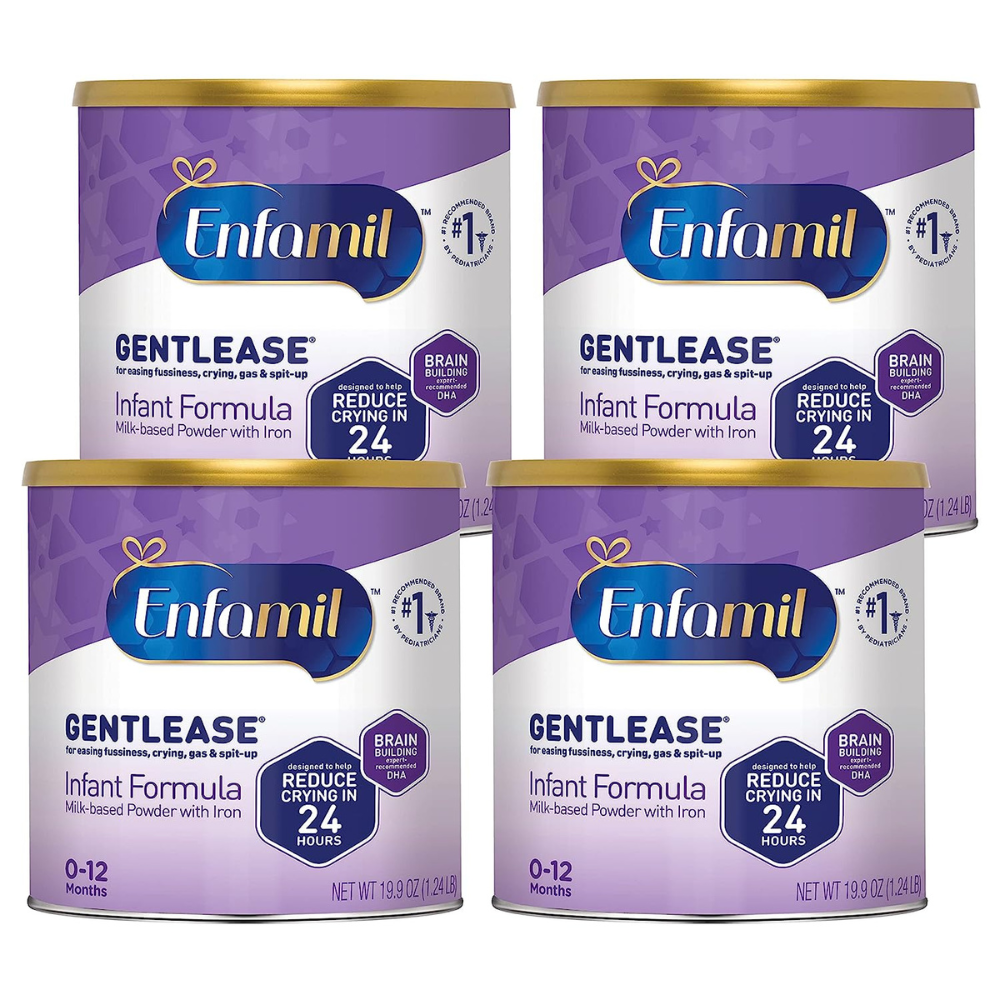
Enfamil Gentlease Baby Formula
Reduces Fussiness, Crying, Gas and Spit-up in 24 hours #ad #CommissionsEarned
What We Love
Welcome to the world of good health! Enfamil Gentlease Infant Formula is designed just for your little one's sensitive stomachs, and scientifically formulated with easily digestible proteins. Give your baby peace of mind with this gentle best perfect formula clinically proven to alleviate fussiness, gas, colic and crying within 24 hours. With Enfamil Infant Formula, you can trust that your child will receive tailored nutrition for babies up to 12 months old—inspired by the nutrients found in breast milk. Did you know that our unique Triple Health Guard blend contains 30 different nutrients for growth? Plus, it has omega-3 DHA and Choline to help enhance learning potential too! We don't stop there: Our exclusive prebiotics blend helps promote a healthy gut flora. Now that’s something worth celebrating! Say hello to happy moments with the power of Enfamil Gentle Formula!
What You Should Know
As a new parent, finding the right nutrition for your infant can be a daunting task. That's why Enfamil Gentle Formula is a game-changer for sensitive tummies. With easily digestible proteins and clinical proof of its effectiveness in alleviating fussiness, gas, colic, and crying within 24 hours, it's no wonder that Enfamil is the trusted choice for parents. What's more, Enfamil is backed by extensive research on breast milk and numerous clinical studies on cognitive development benefits. With tailored nutrition for infants up to 12 months, this baby formula is designed to mimic the composition of breast milk, so you can be sure that your little one is getting the best start in life. So, if you're looking for a gentle and best gentle formula that supports your baby's growth and learning potential, look no further than Enfamil Gentlease.
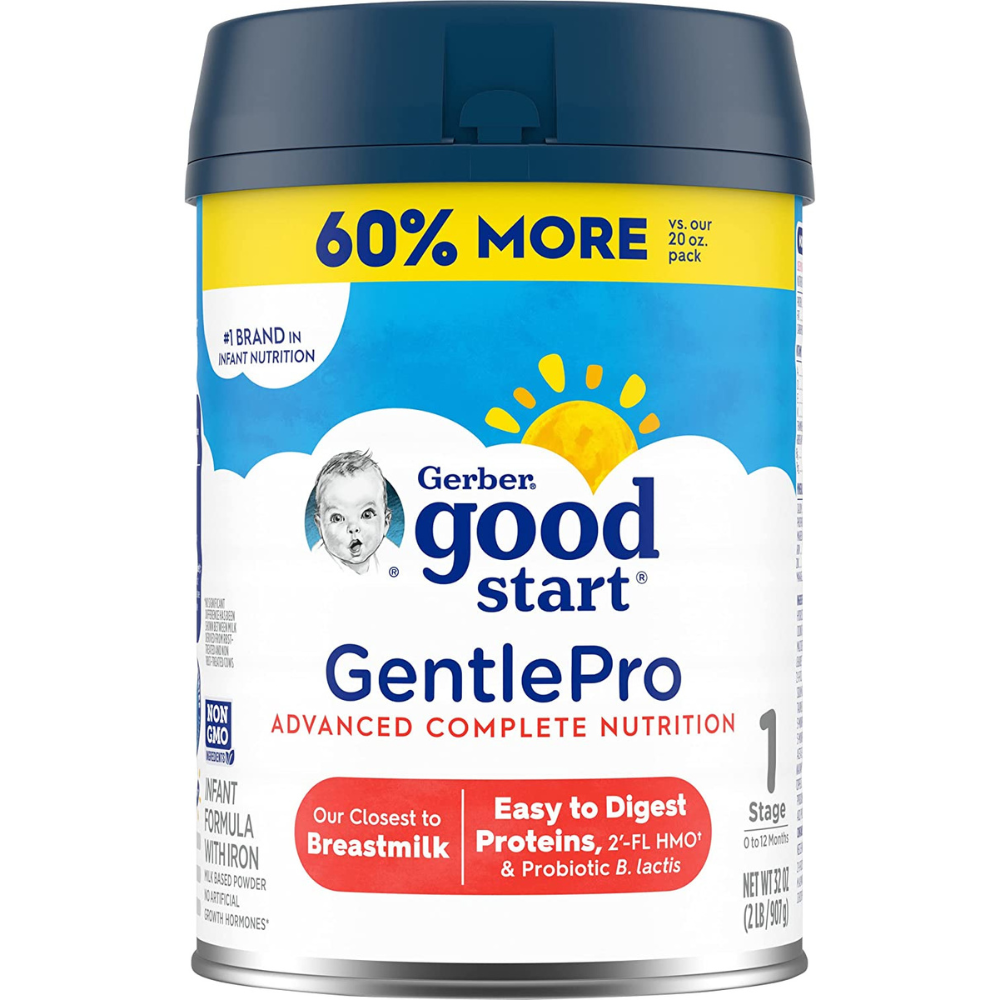
Gerber Good Start Baby Formula Powder
GentlePro, Stage 1, 32 Ounce #ad #CommissionsEarned
What We Love
Welcome to parent life! We know you're looking for the best nutrition to start your baby's journey, and we have it. Gerber Good Start Baby Formula Powder offers complete nourishment for babies up to 12 months old, designed with parents in mind. Our baby formula is modeled after the gentleness of breastmilk and contains Comfort Proteins, prebiotics and DHA to help support brain and eye development.
Gently crafted with care by Gerber experts, each scoop of this baby formula can give your baby balanced nutrition that they need when they reach 12 months of age. While mom's milk will always be one of the best sources of nutrients for an infant, getting your growing bundle of joy started off right is essential – and that’s where we come in.
This comfort-focused powder makes switching from breastmilk or baby formula easy – its proteins are easy to digest and gentle on little tummies. Even better, our Gerber Good Start line ensures that as your baby grows, their nutrition needs grow too. Introduce them to complimenting products like single grain cereals and 1st fruits and veggies purees so they can grow up strong! So never fear; you’ve got everything you need here in just one scoop! Pick up yours today – happy parenting begins here!
What You Should Know
Are you a new mom searching for the perfect formula for your little one? Look no further than Gerber Good Start! Our Gentle and best baby formula is modeled after the complete nutrition of breastmilk and offers complete nutrition for babies up to 12 months. We understand that as your baby grows, their nutritional needs change. That's why we created the Gerber Good Start line, which includes products specially designed to comfort your baby's sensitive tummies at every stage of development. From easy-to-digest Comfort Proteins to prebiotics, and even DHA to support brain and eye development, our baby formula has it all. Plus, we offer complementary staged products like single grain cereals and 1st Foods fruit and veggie purees that your little one will love!
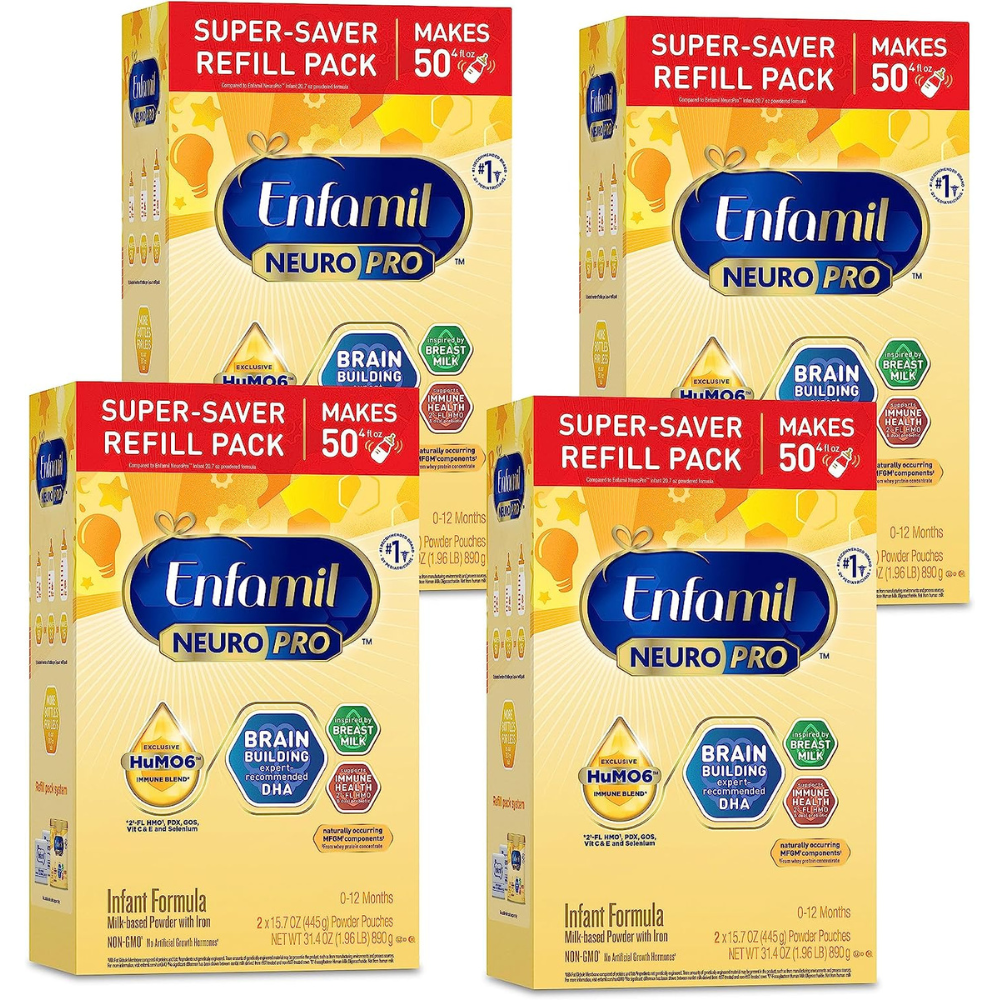
Enfamil NeuroPro Baby Formula
Triple Prebiotic Immune Blend #ad #CommissionsEarned
What We Love
Welcome your little one to the world with Enfamil NeuroPro Baby Formula. Our revolutionary formula is designed to meet both their nutritional and developmental needs, and is recommended by experts and pediatricians alike. It's packed with DHA—an essential nutrient for brain building—and a unique HuMO6 immune blend to support your baby’s health and development. Plus, unlike other formulas this has triple prebiotic immune blend to keep their young immune system strong. That’s why we’re the #1 trusted brand for brain-building nutrition and immune support from day one! Whether you’re breastfeeding or supplementing, you can trust that Enfamil NeuroPro is here to give your little one everything they need for a good start in life. So go ahead, nurture these precious moments by giving them all the nutrition they need today, tomorrow and beyond!
What You Should Know
When it comes to choosing the best baby formula for your little one, it's important to look for brain-building nutrition and immune support. That's why Enfamil NeuroPro Infant is a top choice for many parents. This baby formula has expert recommended DHA, an essential nutrient for brain development. Plus, it has an exclusive HuMO6 immune blend to support your baby's immune system. Enfamil is also unique in that it's the only brand to have both expert-recommended DHA and a triple prebiotic immune blend. With the #1 Trusted Brand for Brain-building & Immune Support, you know you're making a great choice for your baby. Plus, Enfamil is the #1 infant formula brand recommended by pediatricians, giving you extra peace of mind. Give your little one the best start with Enfamil NeuroPro Infant.
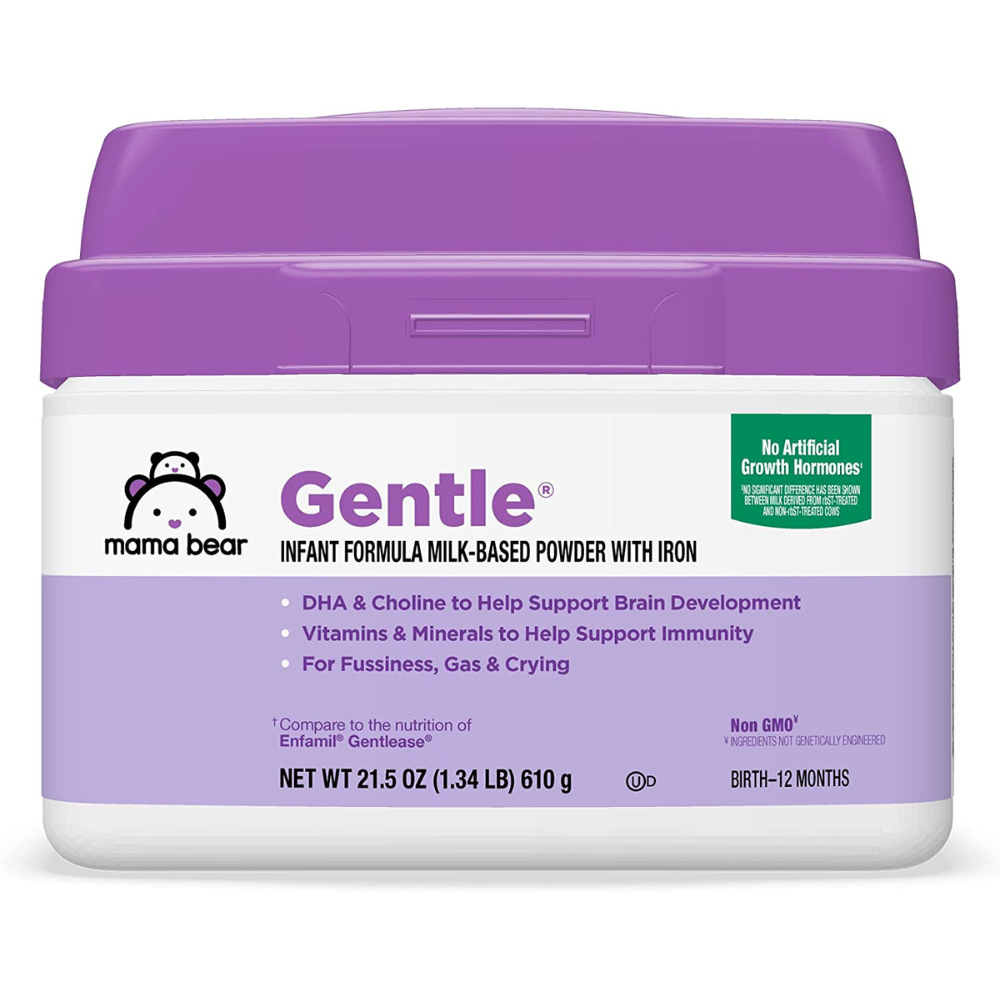
Amazon Brand - Mama Bear Gentle Baby Formula Milk-Based Powder
Infant Formula with Iron #ad #CommissionsEarned
What We Love
Hello moms and dads! Are you looking for a gentle and nourishing baby formula for your little one that won’t upset their delicate tummy? Look no further than Mama Bear Gentle Baby Formula Milk-Based Powder! With a formula specifically designed to be easy on sensitive tummies, your baby will stay happy and healthy. Our infant formula with iron is best of all, Mama Bear doesn’t just settle for being gentle, they’ve crafted ingredients to support your baby’s brain development growth, immunity, as well as vitamins and minerals to help support long-term health. To top it off even more, Mama Bear contains DHA and choline to help baby’s brain development. We know we worry enough about our children so with Mama Bear them in mind, you can rest assured you’re doing everything in your power as a parent to nurture your little one to the best of your ability! A quick add of powder with water is all it takes and then you can sit back and watch your little one thrive!.
What You Should Know
For parents, your little one's comfort and well-being are always top priorities. That's why Mama Bear Gentle Infant Formula Powder is worth considering. Specially crafted to be gentle on your baby's tiny, delicate tummy, this formula helps reduce fussiness, gas, and crying so that your child can enjoy a more comfortable feeding experience. With complete nutrition for infants from newborn to 12 months, Mama Bear Gentle also goes above and beyond to support your baby's brain development and immunity with key ingredients like DHA, choline, and vital vitamins and minerals. Plus, it's super easy to use - just add powder to water and you're good to go! Compare to Enfamil Gentlease and see the benefits for yourself. Give Mama Bear Gentle Infant Formula Powder a try and provide your little one with gentle, loving nourishment.
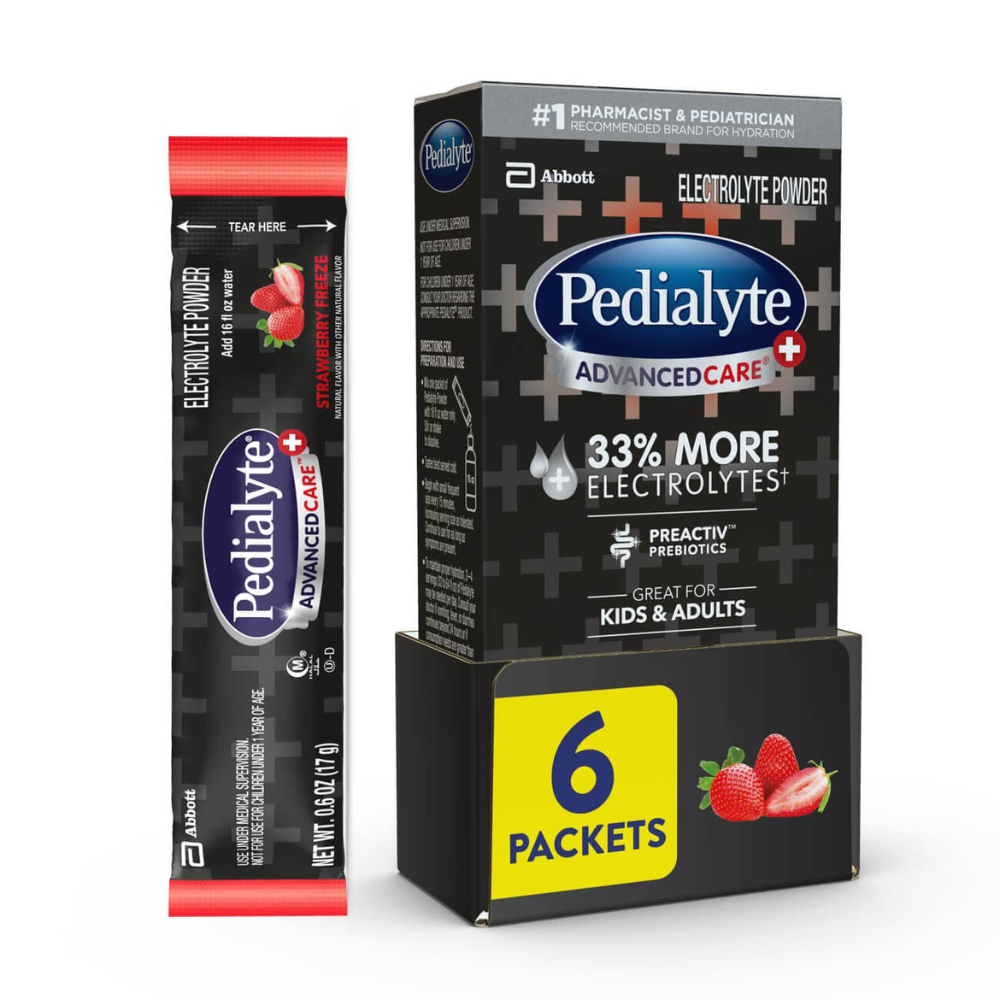
Pedialyte AdvancedCare Plus Electrolyte Powder
with 33% More Electrolytes and PreActiv Prebiotics #ad #CommissionsEarned
What We Love
Welcome to the world of Pedialyte AdvancedCare Plus Electrolyte Powder! Here we have the #1 pharmacist and pediatrician recommended solution for hydration and dehydration prevention†. With 33% more electrolytes than in their original formula*, this powder helps you feel better fast thanks to PreActiv Prebiotics used to support digestive health. Finally, reach your ideal state of health with a product studied and approved by 40 healthy adults, who showed that Pedialyte helps maintain fluid status better than common beverages like water! Get ready to stay fit, active, and healthy with Pedialyte AdvancedCare Plus Electrolyte Powder.
What You Should
Staying hydrated is key to feeling your best, but sometimes water just isn't enough. That's where Pedialyte AdvancedCare Plus Electrolyte Solution comes in. This amazing drink offers 33% more electrolytes than the competition to prevent dehydration and help you feel better fast. Plus, it's backed by the #1 pharmacist and pediatrician recommended brand for hydration, so you know you're getting the best of the best. Pedialyte AdvancedCare Plus even has PreActiv Prebiotics to support digestive health, making it a great choice for both kids and adults. Whether you're recovering from a tough workout or a night of festivities, Pedialyte AdvancedCare Plus is the perfect solution to keep you feeling your absolute best.
Best Formulas for Baby Nutritional Needs Buying Guide
When it comes to selecting the best nutrition for your little one, it can be an intimidating and overwhelming process. There are so many options and not enough guidance or understanding around what to pick.
With so many formulas available on the market you may be left wondering which is the best choice for your baby. You want a product that will give them all the essential vitamins and nutrients they need, but you don't know where to start.
If this sounds like a familiar dilemma, you're in luck! Our team has created an incredibly comprehensive buyers guide to help select the Best Milk Formulas for Your Little One's Nutritional Needs. By using our guide, you'll have peace of mind that you've made the right choice for your bundle of joy.
What are the challenges of baby formula?
There are several challenges associated with baby formula:
- Nutritional Composition: Baby formula aims to provide a balanced and nutritious alternative to breast milk. However, replicating the exact composition of breast milk, which naturally adapts to a baby's changing needs, is difficult. Formula manufacturers strive to create a product that closely mimic breast milk, but variations still exist.
- Digestive Issues: Some babies may experience difficulties in digesting certain components of baby formula. This can lead to issues such as gas, colic, fussiness, or constipation. Formula companies have developed specialized formulas, such as gentle or sensitive formulas, to address these concerns. However, finding the right formula that suits an individual baby's needs can still be a trial-and-error process.
- Allergies and Sensitivities: Babies can develop allergies or sensitivities to cow's milk formulas. Cow's milk protein or soy formula can result in allergic reactions, skin rashes, or digestive problems. Hypoallergenic formulas or specialized formulas for infants with specific allergies or sensitivities are available, but they can be more expensive and may not be as widely accessible.
- Sterilization and Preparation: Proper sterilization of bottles, nipples, and formula preparation equipment is crucial to prevent contamination and ensure the safety of the formula. Parents need to be diligent in following the instructions for sterilization and preparing formula correctly to minimize the risk of bacterial growth or other contaminants.
- Emotional Factors: For parents who are unable to breastfeed or choose not to, using formula can sometimes lead to feelings of guilt, inadequacy, or societal pressure. The emotional aspect of choosing and using baby formula can pose a challenge for some parents, impacting their overall experience.
It's important to note that while baby formula provides a necessary alternative for many infants, breastfeeding is generally recommended as the optimal source of nutrition for babies due to its numerous benefits for both the baby and the mother's health.
What is the most common reason for using infant formula?
The most common reason for using infant formula is the inability or difficulty of a mother to breastfeed. There are various reasons why a mother may choose or need to use formula:
- Insufficient Milk Supply: Some mothers may struggle with low milk supply, making it challenging to meet their baby's nutritional needs through breastfeeding alone.
- Medical Conditions: Certain medical conditions, such as hormonal imbalances, breast surgery, or certain medications, can interfere with a mother's ability to produce breast milk or human milk.
- Maternal Health Issues: Maternal health problems, including illnesses, infections, or chronic conditions, may make breastfeeding unsafe or unsuitable for the mother or the baby.
- Infant Health Concerns: In some cases, the baby may have health issues, such as feeding difficulties, allergies, or certain medical conditions that make breastfeeding impractical or contraindicated.
- Personal Choice: Some mothers may choose not to breastfeed due to personal reasons or preferences, such as work commitments, lifestyle choices, or a desire to involve other caregivers in feeding the baby.
It's important to note that while formula provides a necessary alternative for those unable to breastfeed, breastfeeding is generally recommended as the optimal source of nutrition for infants due to its numerous benefits for both the baby and the mother's health.
What are the concerns about formula feeding?
Formula feeding is a major source of nutrition for many infants and, when done correctly, can be safe and beneficial. However, there are certain important concerns that should be taken into consideration before and during the process.
First, it's essential to use only formula made specifically for infants. Formula made for older children or adults contains too much protein which can cause gastrointestinal issues in babies. It's also important to follow instructions carefully whenever preparing infant formula; incorrect mixing or storing could result in bacterial growth which can have serious health consequences.
The source of the water used is also an important factor – tap water may contain minerals or chemicals that could be harmful if consumed through baby formula so consider using bottled distilled water instead. Additionally, specific formula brands of infant formulas such as those containing iron should not be boiled due to changes in its properties that make it potentially hazardous to consume.
Furthermore, exclusive formula-feeding may lead to deficiencies in some micronutrients like vitamin D as well as reduced immunity against infections compared with breastfed infants since breastmilk offers protection from various diseases though immune-rich substances called antibodies which are absent from infant formulas generally available on the market currently. Thus breastfeeding (or combination feeding) is still encouraged by most organizations whenever possible since it has been shown time and again to provide optimum nutrition for babies while being affordable at the same time depending on one’s budget constraints!
What questions might parents of infants have?
Parents of infants may have a wide range of questions as they navigate the journey of caring for their baby. Here are some common questions that parents might have:
- Feeding and Nutrition:
- How often should I feed my baby?
- How do I know if my baby is getting enough milk protein or formula?
- What are the signs of hunger or fullness in my baby?
- How do I introduce solid foods and what foods are appropriate at different stages?
- How can I address feeding difficulties or concerns, such as reflux or allergies?
- Sleep:
- How much sleep does my baby need?
- What are some strategies to establish a sleep routine?
- How can I help my baby sleep through the night?
- What are safe sleep practices to reduce the risk of Sudden Infant Death Syndrome (SIDS)?
- Development and Milestones:
- What developmental milestones should I expect my baby to reach and when?
- How can I support my baby's cognitive, physical, and social development?
- When should I be concerned if my baby is not meeting milestones?
- Health and Safety:
- How do I take care of my baby's skin, nails, and oral health?
- What vaccines does my baby need and when?
- How can I keep my baby safe at home and during outings?
- When should I call the doctor or seek medical attention for my baby?
- Parenting and Well-being:
- How can I bond with and stimulate my baby?
- What are some strategies for managing parental stress and self-care?
- How can I balance work, parenting, and other responsibilities?
- Where can I find support and resources for parenting challenges?
These are just a few examples, and parents may have many more specific questions based on their unique circumstances and concerns. It's essential for parents to seek reliable sources of information, consult healthcare professionals, and join parenting communities to address their questions and receive guidance.
What are the benefits of formula feeding for the baby?
Formula feeding has several benefits for both babies and parents.
For babies, formula can provide a nutritionally balanced diet if it is prepared correctly. It can be much easier to digest than breast milk, making it ideal for infants experiencing reflux or fussy behavior due to an immature digestive system. Furthermore, unlike breast milk which varies in composition depending on the mother's diet or lifestyle choices, formula provides consistent nutrition with each bottle made and fed.
Formula also offers additional convenience for parents who may not have access to breastfeeding support or who might find timed feedings more convenient – such as those needing to go back to work shortly after birth or dealing with irregular sleeping patterns that come along with having a newborn in the home. Ready-to-feed baby formulas are now widely available as well, meaning no additional preparation needs to be done beforehand – simply pour the portioned bottle into a clean cup and serve!
Lastly, formula can help encourage bonding between family members by allowing them all (dad included!) to take part in feeding time without any extra instructions needed from Mom - all anyone needs is ready-made bottles of premeasured formula! No matter your infant feeding preferences, make sure you discuss your individual choices ahead of time with your healthcare provider so together you can determine the best plan of action for you and your baby.
Why is it important to make up a formula feed accurately?
It is crucial to make up a formula feed accurately for several reasons:
- Nutrition and Growth: Accurate preparation ensures that the baby receives the appropriate amount of nutrients necessary for healthy growth and development. Formula provides a specific balance of proteins, carbohydrates, fats, vitamins, and minerals, and accurate measurement ensures that the baby gets the right proportion of these nutrients.
- Hydration: Properly mixed formula provides the necessary hydration for the baby. Inadequate water content in the infant formula can lead to dehydration, while excessive water dilution can result in inadequate nutrition.
- Avoiding Underfeeding or Overfeeding: Accurate measurement helps prevent underfeeding or overfeeding the baby. Underfeeding can lead to inadequate weight gain, poor growth, and nutritional deficiencies, while overfeeding can contribute to issues like obesity, excessive weight gain, and discomfort.
- Digestive Health: Properly prepared formula can help support the baby's digestive health. Incorrect ratios of formula to water can cause digestive problems like constipation, diarrhea, or gastrointestinal discomfort.
- Sterility and Safety: Following the instructions for accurate preparation ensures that the formula and equipment are properly sterilized, reducing the risk of bacterial contamination and potential infections in the baby.
- Consistency: Accurate preparation helps maintain consistency in the baby's feeding routine, promoting a stable and predictable feeding schedule.
To ensure accurate formula preparation, it's essential to carefully measure the required amount of formula powder and water, following the manufacturer's instructions. It's also important to use clean and sterilized bottles, nipples, and other feeding equipment.
If parents have any questions or concerns about formula preparation, it is recommended to consult healthcare professionals or lactation consultants who can provide guidance and support.
What is the benefit of infant formula?
Infant formula has been an integral part of many parents' childcare routine since its invention and can provide significant benefits for both babies and their families.
The primary benefit of infant formula is that it sustains young infants when breast milk is not available or insufficient. It serves as a nutrient-rich alternative that provides all the necessary nutrition to support growth and development in newborns, up to the age of six months. Formula can also be adapted to meet the special needs of particular babies, including those with allergies or intolerances, which makes it a particularly attractive option for many parents.
In addition to its nutritional value, infant formula offers convenience and peace of mind for caregivers who may not have access to breastfeeding support or resources. Many formulas are designed so that they don't need any preparation aside from heating them—reducing time spent on meal prep significantly—and also reduce mess around feeding time thanks to easy cleanup efforts like disposable bottles with measured scoops already inside. The affordability and accessibility make infant formula an enticing option for families who may be unable or otherwise choose not to breastfeed.
Finally, infant formulas have undergone considerable research over the years in order to improve their composition accordingly depending on age range; some even contain substances geared towards supporting brain development during this critical period! This means you're giving your baby high quality nutrition while still enjoying all the conveniences associated with bottle feeding!
What questions should you ask before having a baby?
Preparing for the arrival of a baby involves asking various important questions to ensure a smooth and well-prepared transition. Here are some key questions to consider before having a baby:
- Health and Medical Care:
- Have you consulted with a healthcare provider about preconception health and any potential risks or concerns?
- Are you up to date on your vaccinations and necessary health screenings?
- Have you discussed any existing medical conditions or medications with your healthcare provider to ensure their compatibility with pregnancy?
- Have you considered prenatal care options and selected a healthcare provider or obstetrician?
- Financial Preparation:
- Have you evaluated your financial situation and considered the costs associated with pregnancy, childbirth, and raising a child?
- Have you reviewed your health insurance coverage to understand what is covered during pregnancy and childbirth?
- Have you explored any available parental leave policies or benefits from your employer?
- Lifestyle and Home:
- Have you assessed your living situation to ensure it is suitable for a baby?
- Have you considered childproofing measures to make your home safe for a baby?
- Have you thought about any necessary adjustments to your lifestyle, such as changes to work schedules or daily routines?
- Support Network:
- Have you identified a support system of family, friends, or community resources that can provide assistance during pregnancy and after the baby's arrival?
- Have you discussed and planned for childcare arrangements if needed?
- Have you considered joining parenting groups or classes to connect with other expecting or new parents?
- Parenting and Childcare:
- Have you discussed and shared parenting expectations and responsibilities with your partner or co-parent?
- Have you considered parenting philosophies and approaches that align with your values?
- Have you researched and familiarized yourself with basic infant care, including feeding, sleep, and hygiene?
- Emotional Well-being:
- Have you thought about the emotional and psychological aspects of becoming a parent?
- Have you considered how you will manage stress, self-care, and prioritize your well-being during and after pregnancy?
Remember, each person's circumstances and priorities are unique, so it's essential to tailor these questions and seek personalized advice from healthcare professionals, experienced parents, or parenting resources to address your specific needs and concerns.
How do I properly store and prepare formula?
Storing and preparing formula correctly is essential to ensure that your baby receives the proper nutrition. Formula should be stored and prepared according to the manufacturer’s instructions, but here are some general guidelines for storing and preparing formula properly:
* Store powdered formula in an air tight container at room temperature, away from direct sunlight or heat sources. Make sure to provide adequate ventilation when closing the lid. Some powdered formulas need to be refrigerated before opening; always follow the manufacturer’s instructions for storage prior to use.
* Once opened, liquid concentrate or ready-to-feed formula must either be used within 48 hours (refrigerate between feedings) or discarded after each feeding if not used within 1 hour of preparation. It's not safe to store partially used bottles of liquid concentrate or ready-to-feed formula for later use because bacteria can quickly form in these solutions once they are exposed to air and saliva after a single feeding.
* When making a bottle with both powder and water, it is important that you prepare only as many bottles at one time as you plan on using right away—never store any leftover mixture for later use as this increases safety risks associated with contamination from airborne particles or environmental exposure. Freshly prepared mixtures are less likely to contain bacteria than those made earlier in the day so it's best if infants consume all freshly mixed solution immediately following preparation of their bottle each day.
* Always wash your hands thoroughly before handling any type of infant/baby food product including mixing utensils, measuring devices and bottles -- this helps reduce potential contamination from contact with other surfaces touched during daily activities like using door knobs and light switches throughout your home environment.
Can I mix breast milk and formula?
Yes, you can mix breast milk and formula for your baby. However, it's important to understand that breast milk is the preferred source of nutrition for infants due to its high nutritional content. The American Academy of Pediatrics recommends exclusive breastfeeding through at least 6 months of age and continued breastfeeding while introducing complementary foods until a child’s first birthday or longer as mutually desired by mother and infant.
When adding formula to breast milk, it's best to talk with your healthcare provider about which type is right for your child and what ratio they recommend you use. As the amount of formula in each bottle changes over time as an infant grows older (the amount given will decrease from week-to-week) this ratio should be adjusted accordingly. It's also advisable not to make drastic changes in diet without consulting a doctor first as doing so could affect nutrients absorbed by the infant into their body system such as minerals and vitamins which could lead to complications in their overall health development including an increased risk for illnesses such as obesity. Ultimately, when mixing breastmilk with formula ensure that all instructions are followed properly according to what has been recommended by your healthcare provider before proceeding with different approaches like mixing them together in a bottle or offering them separately throughout the day – this will ensure that your baby receives all necessary nutrients they need during their early years!
Highly-Rated Formulas For Your Little One's Nutritional Needs
All the formulas we discussed in this blog have been highly recommended by verified customers who have first-hand experience with them. Whichever formula you choose for your baby, you can guarantee the best quality and nutrition for your infant’s development. We are sure that any of these excellent products will bring happiness to both parents and infants alike! So take a look at our recommendations again. Maybe one of them singled out more than the others? If so, it may make more sense to invest in that formula.
Just remember, no matter which way you go regarding what formula you chose for your little one-you must ensure it meets their condition and delivers all the nutrients they need to stay strong. Tap the button now to check prices, reviews, ratings and availability!
Note: As an Amazon Associate I earn from qualifying purchase
This article could include affiliate links, implying that I might earn a minor commission from product sales made through these links. Rest assured, all viewpoints are sincere and continue to reflect my personal stance.
